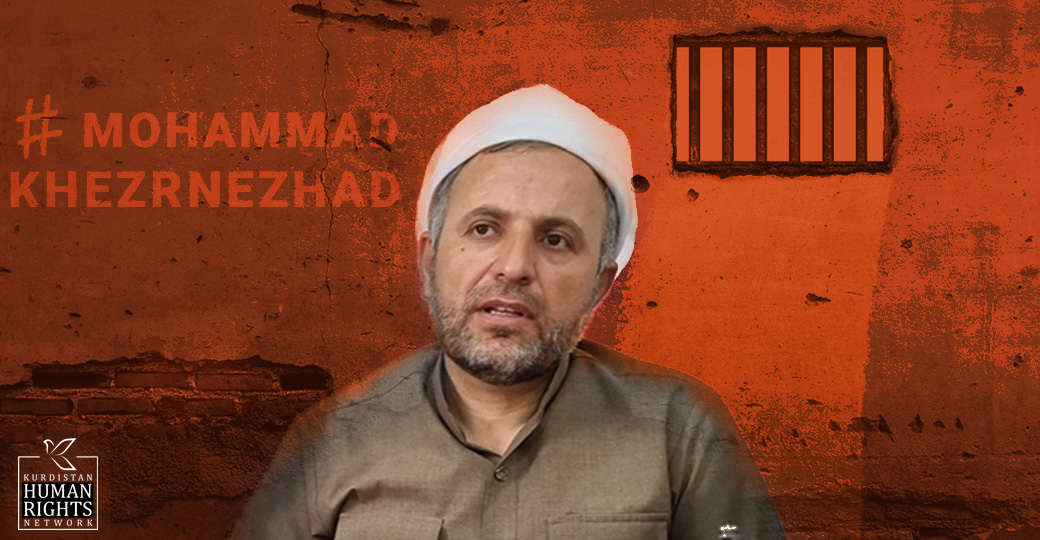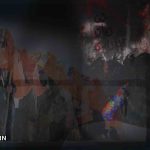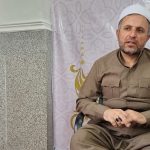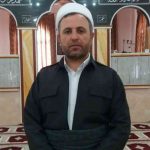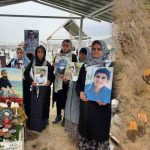Mohammad Khezrnezhad holds a master’s degree in Arabic Literature and has been primarily engaged in research and translation in the field of Islamic studies in recent years.
Over the past 20 years, he has been forced to leave his position as an imam in various mosques in the cities of Sanandaj, Kurdistan Province, and Bukan, as well as villages in the region, several times due to pressure from security forces.
Arrest
Khezrnezhad was arrested at his family home in Bukan on 19 November 2022. Security forces forcibly entered the house, subjected him and other family members to violence, and detained his son, Yasser Khezrnezhad, for several days.
His arrest followed a critical speech he gave at a memorial ceremony at the Eftekhari Mosque in Bukan for Asaad Rahimi, one of the protesters killed during the anti-government uprising of Women Life Freedom in Bukan.
After the protests began, the Sunni Kurdish cleric published comments and articles on his Telegram channel expressing support for the protests and commemorating the protesters killed.
In the initial weeks of his detention, he was denied the right to contact or meet with his family and was subjected to severe physical and psychological torture for forced confessions during his 108 days of solitary confinement in the Ministry of Intelligence detention centre in Orumiyeh.
The intensity of the physical torture was such that even after his transfer to Orumiyeh Central Prison, its effects were visible on his body.
Judicial Process
In November 2023, Khezrnezhad was sentenced to death and 16 years in prison by Branch Three of the Islamic Revolutionary Court of Orumiyeh, presided over by Reza Najafzadeh, on charges of “spreading corruption on earth” (efsad-e fel-arz), “harming the territorial integrity or independence of the country”, and “propaganda against the state”.
His trial, conducted over four brief sessions, the last being in November 2023, was held via video conference without the right to legal representation. The judge, solely relying on reports from the Ministry of Intelligence, including recorded videos of his coerced confessions under torture during detention, issued the verdict without hearing the explanations or defences of the accused.
Despite not having sufficient time to defend himself during the court sessions, Khezrnezhad denied all the charges and stated that all the confessions, including the recorded video, were obtained under duress and as a result of severe torture by the Ministry of Intelligence.
He also questioned the competence of the Revolutionary Court to deal with the accusations against him, given his status as a cleric.
In April 2024, the verdict was fully upheld by Branch 41 of the Supreme Court, presided over by Judge Ali Razini.
In June 2024, news agencies affiliated with the Islamic Republic of Iran announced that this sentence had been commuted to imprisonment. However, the exact length of the prison term has not yet been officially communicated to the prisoner or his lawyers.
Current Status
Khezrnezhad is currently being held in Orumiyeh Central Prison.
Additional Information
– On 3 May 2016, a group of Sunni clerics and scholars issued an open letter to the country’s Chief Justice, denouncing the unfair issuance of the death sentence Khezrnezhad. They rejected all allegations against him and demanded his release.
Notes:
1. Women, Life, Freedom Uprising: Jina Amini (Mahsa Amini), a 21-year-old Kurdish woman from Saqqez, Kurdistan Province, was arrested on a street in Tehran on 13 September 2022 by the morality police because of the way she was dressed. Shortly after her arrest, she was transferred to Kasra Hospital in Tehran with head injuries and symptoms of brain death, and passed away three days later on 16 September 2022. The government’s killing of Jina sparked unprecedented anti-government protests, which began with a large turnout at her funeral at Aichi Cemetery in Saqqez and quickly spread to many cities across Iran. These widespread protests against the Islamic Republic of Iran, which lasted for several months, resulted in at least 527 protesters being killed and thousands injured and arrested. The protests are known for their central slogan of “Women, Life, Freedom” (Kurdish: Jin, Jiyan, Azadi).
2. Article 286 of the Islamic Penal Code: “Anyone who extensively commits crimes against the physical integrity of individuals, crimes against the internal or external security of the country, dissemination of falsehoods, disruption of the country’s economic system, arson and destruction, distributing toxic, microbial, and dangerous substances, or establishing centres of corruption and prostitution or assisting in such activities, in a manner that causes severe disruption to public order, insecurity, or significant damage to the physical integrity of individuals or public and private property, or leads to widespread corruption or prostitution, shall be considered a corrupter on earth.”
3. Article 2 of the Law on Punishment for Actions Against National Security and Independence: “Anyone who, in any manner, takes action to separate any part of Iran or to harm its territorial integrity or independence shall be sentenced to life imprisonment with hard labour.”
4. Article 500 of the Islamic Penal Code: “Anyone who engages in propaganda activities against the Islamic Republic of Iran or in favour of groups and organisations opposing the state, in any manner, shall be sentenced to imprisonment for a period of three months to one year.”

